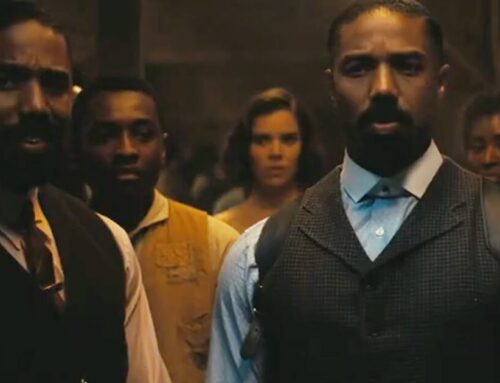I’ve had women on the brain at the movies lately, and we are out there in significant numbers this season along with the boys of summer. I happened to see two sequels MAD MAX: FURY ROAD and PITCH PERFECT 2 on the same day and fully expected to tolerate the former and enjoy the latter. Not even close. PITCH “imperfect” began with a crude joke, meandered through a pointless plot, and was DOA at an anticlimactic showdown featuring a weird cameo by GMA’s Robin Roberts. Huh?
And then there was MAD MAX:FURY ROAD once again co-written and directed by the franchise’s one and only George Miller, and starring Tom Hardy as everyman warrior Max Rockatansky and the glorious Charlize Theron as the rebel Imperator Furiosa– and she is more than up to that moniker. The woman can handle a gun and a feminist agenda.
Some things never change. It’s chaos out there: scorched earth, scant resources, warring tribes, an enslaved underclass, supercharged weapon-laden muscle cars outfitted with fire-breathing guitars and drummers, in hot pursuit of diaphanously-clad women-wives imprisoned for their leggy beauty and breeding ability. So what’s new?
Not Miller’s now hyper-control of every frame, every bit of sound, every densely edited action sequence and ratcheted-up high stakes momentum, resulting in an impossibly visceral sense of do or die intensity. From the first minute, I felt like I’d been shot out of a cannon and never stopped. Somehow Miller sustains the intensity despite the relentless pace and with the texture of characters in whom we still sense more than a shred of humanity. The bare bones world in which Max is fighting to survive has reduced him to a raw and violent warrior, and when he first encounters the renegade Imperator Furiosa who’s in the process of rescuing the imprisoned women, he’d just as soon kill her.
But here’s what’s new. First, Furiosa is a woman who’s attained political power and is a player in a man’s world. Second, Max bonds with Furiosa, initially in order to defeat a mutual enemy, but later because they have mutually beneficial goals: she will help retake The Citadel with the additional aid of the enslaved wives (who also turn out to be potent warriors) as well as a band of older, wiser women warriors “The Vuvalini” who have kept the flame of Furiosa’s “home…the Green Place” alive. Women and men at every level are seen as sharing the same “omni-sexual” qualities and desires which together triumph over a dehumanized, polarized world. Both Mother’s milk and blood bags nurture and fuel the action. I like those politics, and God help me, I was exhilarated by the sheer power of the action. yep.
Which brings me to proto-feminist and novelist Thomas Hardy’s heroine of FAR FROM THE MADDING CROWD: Bathsheba Everdene played by the excellent Carey Mulligan. This is a truly luscious-looking movie, rolling green and wild hillsides, candlelit ballrooms and dappled forest encounters–if you like that sort of thing, and I do. When Bathsheba inherits her uncle’s farm, she has no trouble running it and asserting her intelligence and resourcefulness. She is indeed far from the madding crowd of the day, who’d say she just needs a man. What does she say? Well, it’s complicated.
Indeed, Bathsheba is torn among three lovers: the solid farmer Oaks played by the quietly charismatic Matthias Schoenaerts; her wealthy high-strung neighbor Mr. Boldwood in an exceptional performance by Michael Sheen; and the dashing, jilted Sergeant Troy played by a narrow-eyed Tom Sturridge with an evil mustache. Will she make the right choice and how are those choices governed by her own self-awareness, and her fate as a woman ahead of her time in a sometimes rugged, unforgiving world?
Mulligan conveys the headstrong irresistibility of a sensible woman who might coast on her beauty and dowry, but is determined to make it on her brains and resourcefulness. But the movie streamlines the richness of Hardy’s characters and prose, minimizing the complexity of the drama. When Bathsheba is pressed for an answer by one of her suitors and says, “It is difficult for a woman to define their feelings in a language chiefly made by men to express theirs,” I was floored not only by the nuance and modernity of the utterance, but also because it contradicts an earlier avowal in which she declares she’s holding out for a man who can “tame” her. The film shies away from probing the complexity of a woman who could say both. The internal dilemma she would find herself in is precisely the place where Hardy wants her, but the choices she makes in the movie are less convincing than they otherwise might have been had we known how deeply conflicted she was. Mulligan’s subtlety as an actress cannot wholly fill in the gaps.
Despite this attempt to simplify Hardy on the big screen for the madding modern movie crowd, the filmmakers have certainly delivered beautiful images and fine performances. Now go back to the book for a deeper story.
It’s been awhile since I’ve seen the cool, enigmatic beauty Catherine Deneuve in a film. Here in IN THE NAME OF MY DAUGHTER, she brings the power of her glamorous persona tempered by a maternal single-mindedness to a solid accessible performance. But despite the lush scenery of the French Riviera, and a juicy real life plot involving, the film co-written and directed by Andre Techine is much less than the sum of its parts, and the last third of the movie feels like a foreign limb gruesomely tacked on and plodding to a limp conclusion.
The film is based on a true life mystery set in the mid 70’s involving young heiress Agnes LeRoux (Adele Haenel), daughter of Renee LeRoux (Catherine Deneuve) of the Palais de la Mediterranee a casino targeted for takeover by the formidable Mr. Fratoni (Jean Corso). Fresh from a divorce and looking for a new start, Agnes returns home but is unable to obtain her share of her father’s inheritance from her financially strapped mother. She finds herself drawn to the family lawyer/advisor Maurice Agnelet (Guillaume Canet) with whom she begins a passionate affair, and who also has his eye on managing the casino. When Madame LeRoux hires someone more experienced for the job, Agnes and Maurice conspire to retrieve Agnes money by selling Agnes voting rights to control the casino to Fratoni. Mother goes bankrupt, daughter goes missing, lawyer returns to his wife and mistresses.
The case drags on for 30 years, until Renee finally has her day in court and attempts to prove once and for all that Maurice murdered her daughter Agnes whose body was never found. These courtroom scenes are bizarrely out of tune, and feel like they belong to another film! Sure– truth is stranger than fiction but a filmmaker’s job is to integrate the whole and focus on the themes that bind; here that would be the emotional triangle of love and betrayal between mother & daughter, daughter & lover, lawyer & employer. It’s never clear why Agnes SO deeply resents her mother, though Agnes seems a loose cannon from day one, all too apparent in a scene where she does a wild African dance for her soon to be inamorata Maurice. Haenel is a striking presence and terrific in the part of this rebellious, suicidal soul. Guillaume Canet plays it perfectly as her lover, business partner, and murderer(?) We have no trouble seeing him as all three: grasping social climber, ladies man, and monster.
The air goes out of the film in the last third, which finds the main characters spackled with pancake and prosthetics, the wax works clogging up the works, along with a story that dies with a written epilogue solving nothing at the credits. Too little. Too late. I’d lost interest.






[…] Joyce Kulhawik reviews FAR FROM THE MADDING CROWD, IN THE NAME OF MY DAUGHTER and MAD MAX […]